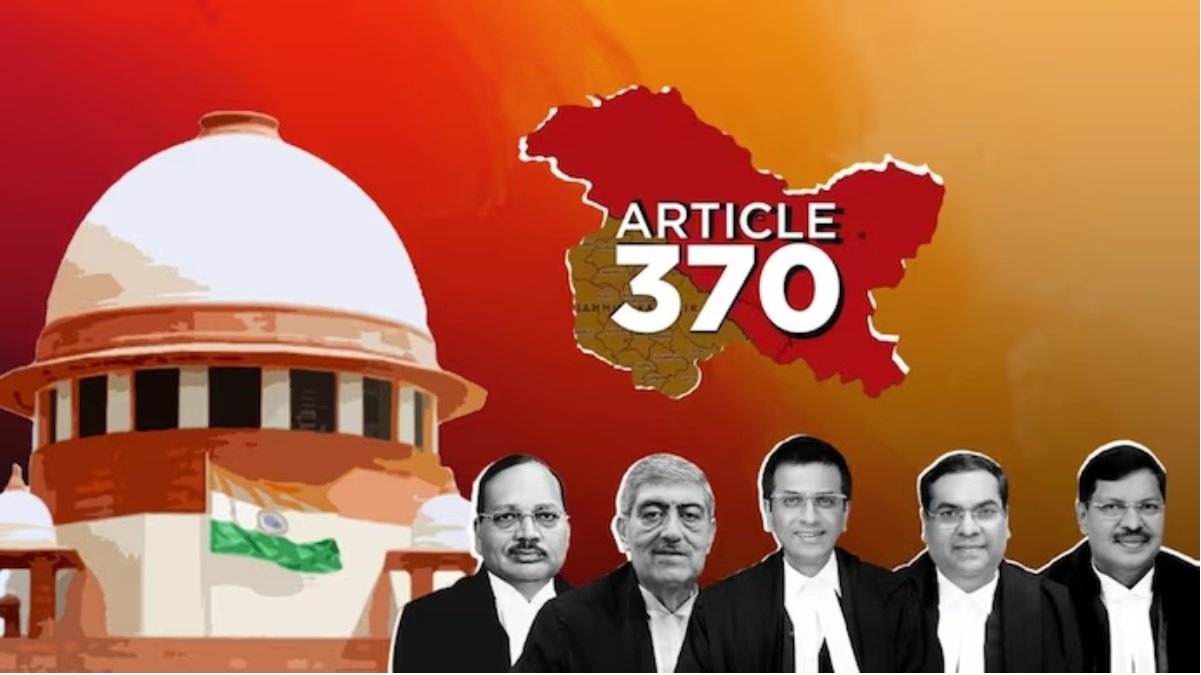Supreme Court verdict on Article 370 of the Constitution of India
Article 370 Hearing in SC: The Supreme Court has completed the hearing on the Article 370 case. The Constitution Bench of 5 judges headed by the Chief Justice heard the arguments of both sides for 16 days and reserved the decision today i.e. on 5 September 2023. During this, both sides discussed constitutional aspects and historical developments. The matter became particularly heated when the court sought an affidavit from the main petitioner Mohammad Akbar Lone that he considers Jammu and Kashmir as an integral part of India.
What is the matter?
On August 5, 2019, Parliament passed a proposal to abolish the special status given to Jammu and Kashmir under Article 370. Besides, a decision was also taken to divide the state into two union territories, Jammu Kashmir and Ladakh. This decision was challenged in the Supreme Court through 20 petitions. Now this case was heard by the Constitution Bench headed by Chief Justice DY Chandrachud. The remaining members of the bench are Justice Sanjay Kishan Kaul, Sanjeev Khanna, BR Gavai, and Surya Kant.
2 petitioners withdrew the petition
The first two petitioners in the case, Shah Faesal and Shehla Rashid, withdrew their petitions even before the hearing began. Therefore, the court directed to remove the names of both from the list of petitioners. After this, the name of National Conference MP Mohammad Akbar Lone came first on the list of petitioners.
Arguments of the petitioner’s side
Senior advocate Kapil Sibal appeared on behalf of Lone. Apart from him, many senior lawyers like Rajeev Dhawan, Gopal Subramaniam, and Zafar Shah demanded quashing of the decision to neutralize Article 370. These lawyers said that the merger of Jammu and Kashmir with India took place under special circumstances. Therefore, he got a different status. The state had a separate Constituent Assembly, whose work was completed in 1957. The decision to remove Article 370 from the Constitution of India could have been taken only with the consent of the Constituent Assembly of Jammu and Kashmir. Therefore, the decision of Parliament is wrong in law.
Judge not convinced
The judges of the Constitution Bench did not seem to agree with this argument of the petitioner side. He said that the Constituent Assembly of Jammu and Kashmir came to an end in 1957. But this cannot mean that just because of this, Article 370 should be considered permanent. Making an important comment, the Chief Justice said, “It is true that Parliament could not make laws on some subjects of the state, but this does not affect the relationship of Jammu and Kashmir with India. This was the meaning of the merger with India. That Jammu and Kashmir handed over its sovereignty to India.”
‘Satypal Malik’s statement was given later’
The statement of former Jammu and Kashmir Governor Satyapal Malik was discussed on behalf of a petitioner opposing the neutralization of Article 370. In an interview given to a website, Malik had said that he was the Governor of Jammu and Kashmir, but he did not know what the central government was going to do regarding Article 370. There was no discussion with him. But the judges rejected this argument and said that what the former Governor said was a statement given much after leaving the post. This does not affect the matter.
6 days of cross-examination in support of the government
For the first 9 days, the petitioner side presented its views. After this, the central government and the organizations supporting its decision gave arguments for 6 days. On the 16th i.e. the last day, the petitioner party once again presented its views. Attorney General R Venkataramani and Solicitor General Tushar Mehta cross-examined on behalf of the central government. Apart from this, many organizations also expressed their support for the Centre’s decision. Many big lawyers like Harish Salve, Rakesh Dwivedi, and Mahesh Jethmalani appeared for such organizations.
What did the Center say?
The Center told the court that the decision to neutralize Article 370 was taken in the national interest as well as for the welfare of the people of Jammu and Kashmir. The Attorney General stressed the aspect of the integrity of the nation. On the other hand, the Solicitor General said that in the old system, Article 35-A was also applicable in Jammu and Kashmir. Due to this, a large number of people settled in the state were not given the same rights as other citizens. He couldn’t buy property, couldn’t even vote. Now those people have become equal to everyone else.
Jammu and Kashmir will get statehood again
During the hearing, the Supreme Court sought information on the restoration of the democratic process in Jammu and Kashmir. On this, the Central Government said that assembly elections will be held soon in the Union Territory of Jammu and Kashmir. The work of updating the voter list is in the final stages. The Centre’s counsel also said that Jammu and Kashmir will be given statehood. But when this happens, it cannot be told yet. However, the government made it clear that Ladakh will remain a Union Territory in the future.
Affidavit of loyalty to the country sought from the petitioner
On the 15th day of the hearing, social organization ‘Roots in Kashmir informed the court that petitioner Mohammad Akbar Lone had once raised the slogan ‘Pakistan Zindabad’ in the Assembly. Apart from this, ‘Roots in Kashmir also gave information about many loan statements to the court. All these statements were anti-India and sympathetic to terrorism. After this, Solicitor General Tushar Mehta told the court that an affidavit of loyalty to the country should be asked for the loan. On this, the court asked for a written affidavit from Lone that he considers Jammu and Kashmir as an integral part of India. He does not support separatism and terrorism
